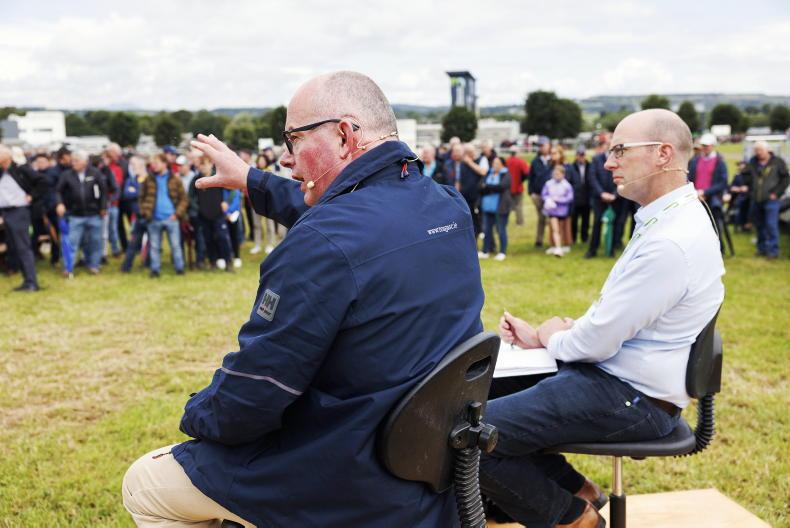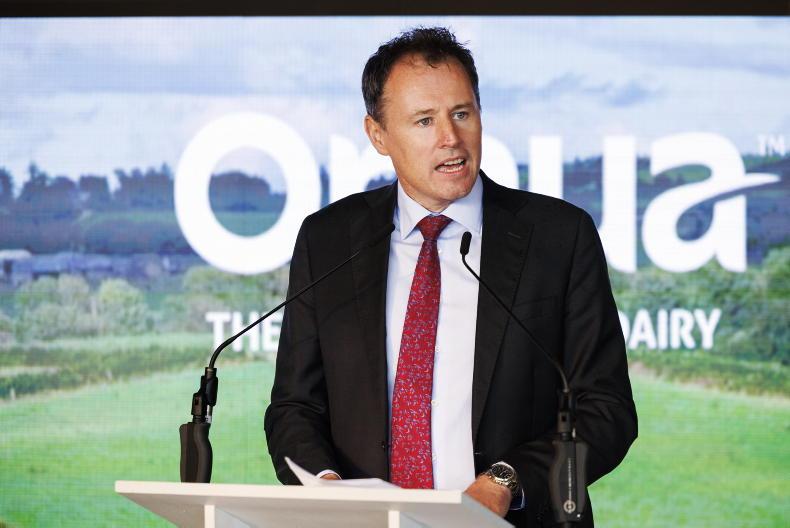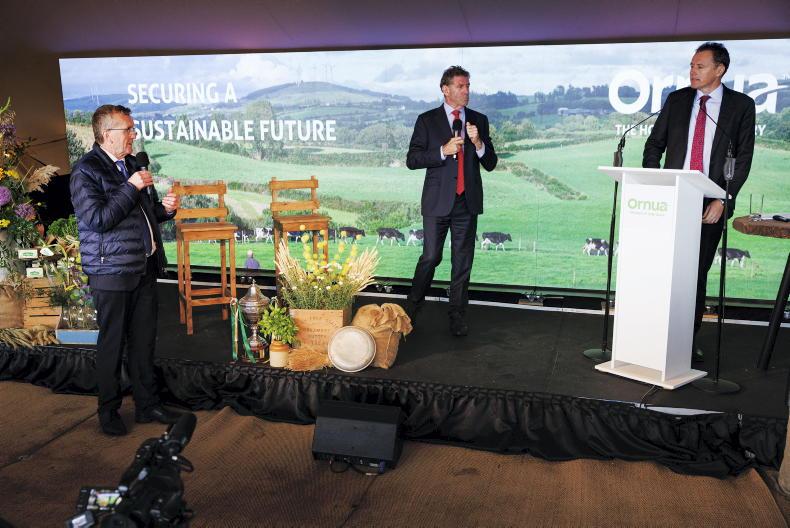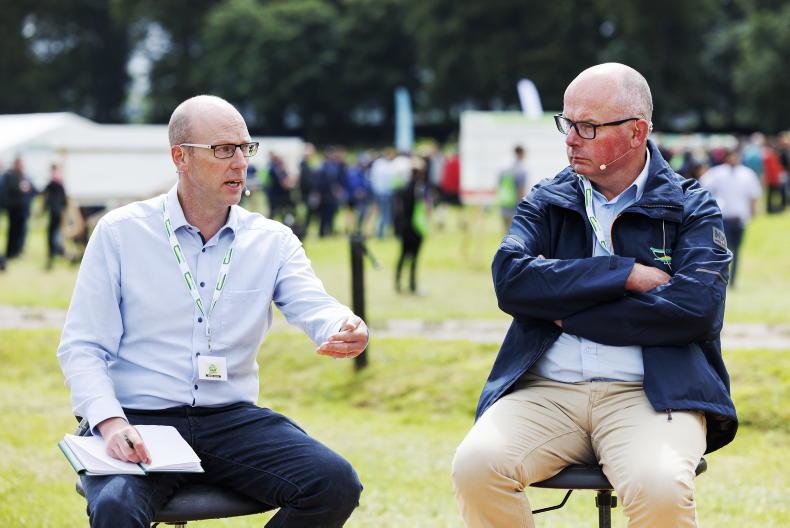Anyone who attended the Moorepark open day last week and heard Ted Massey, the senior inspector in the Department of Agriculture, speak on the subject of Ireland’s nitrates derogation, probably went away disillusioned.
Ted’s closing remarks, that he’s not confident we will have a derogation by 2030 is most telling. Whatever about the harm cutting the derogation from 250kg to 220kg N/ha will do, losing the derogation outright will create a bloodbath.
Equally, Eddie Burgess’s scientific view that reducing stocking rate when it is already at an appropriate level will not improve water quality was just as rankling.
He is heading up the Teagasc Agricultural Catchments Programme so he knows what he’s talking about. The questions farmers are asking is why are they being regulated out of existence if it will do nothing for water quality?
Every pantomime needs a villain and it’s easy to fall into the trap of thinking that Ted Massey, or his counterparts in the Department of Housing, Local Government and Heritage are those villains for not maintaining the derogation at 250kg N/ha. For me, that’s too simplistic.
The real villains are the politicians for failing to hold policymakers to account and for not letting science win the argument.
Take the Environmental Protection Agency (EPA). OK, they don’t set policy but they do influence policy. Reading their most recent annual water quality indicator report, the EPA quite clearly lay the blame for water quality at the hands of farmers.

Ted Massey, Department of Agriculture, and Edward Burgess, Teagasc, on water quality and the nitrates derogation speaking at the Moorepark open day 2023. \ Donal O'Leary
In the report published last month, it says: “Nitrate concentrations are too high in 40% of river sites nationally and in 20% of estuarine and coastal water bodies. These elevated levels are found mainly in the south and southeast and are too high to support good water quality in our estuaries. This is primarily attributable to intensive agricultural activities on freely draining soils in these areas.
“Most of the nitrogen in Irish waters comes from organic and inorganic fertilisers. Average nitrate levels in rivers and groundwaters increased nationally between 2021 and 2022. While levels can fluctuate between years, based on climate, there is no indication that nitrate levels are reducing.”
Water quality
However, looking at water quality over the last four years as per Table 1, we can quite clearly see that in the 2018 to 2020 period, the percentage of rivers with unsatisfactory nitrate quality was 47% while this dropped back to 40% in the 2020 to 2022 period. Yet, the EPA report says there is no evidence that nitrate levels are reducing.
The Irish Farmers Journal put it to the EPA that it failed to mention this in its report. When presented with this table, the EPA agreed that “the data does show an apparent improvement in nitrate levels since 2018-2020”.

Ted Massey, Department of Agriculture, and Edward Burgess, Teagasc, on water quality and the nitrates derogation speaking at the Moorepark open day 2023. \ Donal O'Leary
Its statement went on to say: “However, as is widely recognised, the 2018 summer was very dry and the extra mineralisation combined with the higher than average fertiliser use that year, led to very high N concentrations in the autumn of 2018 and the following spring in 2019. This resulted in the 2018 and 2019 annual average concentration figures (and corresponding three year averages) being unusually high.”
In other words, the weather was a big factor for nitrate levels being so high in 2018 and 2019.
However, when the EPA originally published the nitrate quality results for those periods there was no mention of the lower than normal rainfall during the period. Instead, it was intensive agriculture that was to blame and not the fact that extra nitrogen was mineralised by soils during the drought. So farmers are to blame for increasing nitrate levels but the weather is to get the credit for bringing them down again.
This is important because it is the narrative told by the EPA that is picked up by the media and politicians.
The single biggest impact on river nitrate levels is the weather. The southeast and midlands will always have the highest nitrate levels in rivers because of the nature of the soils and the fact that they get less rainfall to dilute the concentrations. That is not to absolve farmers of all responsibility to do more to protect water quality, but the EPA should also be doing more to highlight these natural factors.
At EU level, the problem is even worse.
The European Green Deal and Farm to Fork strategy dominates all aspects of the Commission’s work. The architect of that programme is Frans Timmermans and he has overarching control over the environment directorate – who decides Ireland’s nitrates derogation.
When I met senior members within the environment directorate last October, such was their negative attitude towards farming that it was difficult to distinguish between them and hardcore members of an environmental NGO.
It is obvious that people who care deeply about the environment are now occupying senior positions of authority within important organisations in both Ireland and Brussels. This is by no means a bad thing once personal prejudice, where it exists, doesn’t get in the way of making sound, science-based decisions.
This is where our elected officials have a very important role to play in holding these policymakers to account.
Both Ted and Eddie were unequivocal in their views that cutting the derogation won’t improve water quality and Ted said that they repeatedly put that to the Commission.
If they are not following the science, then that needs to be highlighted.

Minister for Agriculture, Food and the Marine, Charlie McConalogue speaking at the Ornua forum during the Moorepark open day 2023. \ Donal O'Leary
The fact that the Commission requested to compare one year’s water quality with the next is very wrong, yet it got away with it.
Also, speaking in Moorepark was Minister for Agriculture Charlie McConalogue. Both he and his Department officials are now regularly saying that because there are potentially only two countries left with a derogation that it is going to be harder for Ireland to secure one.
This is inconsistent with EU policy. It is the officials within the Commission that decide on whether a country merits a derogation and this is then ratified by officials from other countries at the nitrate committee meetings. It is not the case that, say, just because the Netherlands no longer has a derogation that it would vote against Ireland’s derogation being ratified.
Convincing the Commission
The only people that need to be convinced here are the Commission. Officials from the Department of Agriculture have clearly failed in their attempts to seek more time for the new measures to have an even greater impact on water quality before the cut to the derogation is introduced.
We now need Irish and European politicians to step up to the plate and demand accountability from the European Commission. If draconian action is necessary to improve water quality then so be it.

Minister for Agriculture, Food and the Marine, Charlie McConalogue answering questions from IFA president Tim Cullinan at the Ornua forum during the Moorepark open day 2023. \ Donal O'Leary
The farmers I speak to are willing to reduce their nitrogen inputs – they already have and they’ll reduce further if needs be. They are willing to do a raft of other actions provided that it benefits water quality and doesn’t put them out of business. Cutting the derogation won’t improve water quality and it will put farmers out of business.
Such is the anger and unfairness felt over this topic that there is a very real risk that some farmers will subconsciously decide to opt out of their social contract to protect the environment while producing food.
If their family farm business is decimated by the loss of the derogation, what incentive will they have to continue to obey the rules? History will show that losing the derogation will be the worst thing to happen for water quality in Ireland. It must be maintained.
Anyone who attended the Moorepark open day last week and heard Ted Massey, the senior inspector in the Department of Agriculture, speak on the subject of Ireland’s nitrates derogation, probably went away disillusioned.
Ted’s closing remarks, that he’s not confident we will have a derogation by 2030 is most telling. Whatever about the harm cutting the derogation from 250kg to 220kg N/ha will do, losing the derogation outright will create a bloodbath.
Equally, Eddie Burgess’s scientific view that reducing stocking rate when it is already at an appropriate level will not improve water quality was just as rankling.
He is heading up the Teagasc Agricultural Catchments Programme so he knows what he’s talking about. The questions farmers are asking is why are they being regulated out of existence if it will do nothing for water quality?
Every pantomime needs a villain and it’s easy to fall into the trap of thinking that Ted Massey, or his counterparts in the Department of Housing, Local Government and Heritage are those villains for not maintaining the derogation at 250kg N/ha. For me, that’s too simplistic.
The real villains are the politicians for failing to hold policymakers to account and for not letting science win the argument.
Take the Environmental Protection Agency (EPA). OK, they don’t set policy but they do influence policy. Reading their most recent annual water quality indicator report, the EPA quite clearly lay the blame for water quality at the hands of farmers.

Ted Massey, Department of Agriculture, and Edward Burgess, Teagasc, on water quality and the nitrates derogation speaking at the Moorepark open day 2023. \ Donal O'Leary
In the report published last month, it says: “Nitrate concentrations are too high in 40% of river sites nationally and in 20% of estuarine and coastal water bodies. These elevated levels are found mainly in the south and southeast and are too high to support good water quality in our estuaries. This is primarily attributable to intensive agricultural activities on freely draining soils in these areas.
“Most of the nitrogen in Irish waters comes from organic and inorganic fertilisers. Average nitrate levels in rivers and groundwaters increased nationally between 2021 and 2022. While levels can fluctuate between years, based on climate, there is no indication that nitrate levels are reducing.”
Water quality
However, looking at water quality over the last four years as per Table 1, we can quite clearly see that in the 2018 to 2020 period, the percentage of rivers with unsatisfactory nitrate quality was 47% while this dropped back to 40% in the 2020 to 2022 period. Yet, the EPA report says there is no evidence that nitrate levels are reducing.
The Irish Farmers Journal put it to the EPA that it failed to mention this in its report. When presented with this table, the EPA agreed that “the data does show an apparent improvement in nitrate levels since 2018-2020”.

Ted Massey, Department of Agriculture, and Edward Burgess, Teagasc, on water quality and the nitrates derogation speaking at the Moorepark open day 2023. \ Donal O'Leary
Its statement went on to say: “However, as is widely recognised, the 2018 summer was very dry and the extra mineralisation combined with the higher than average fertiliser use that year, led to very high N concentrations in the autumn of 2018 and the following spring in 2019. This resulted in the 2018 and 2019 annual average concentration figures (and corresponding three year averages) being unusually high.”
In other words, the weather was a big factor for nitrate levels being so high in 2018 and 2019.
However, when the EPA originally published the nitrate quality results for those periods there was no mention of the lower than normal rainfall during the period. Instead, it was intensive agriculture that was to blame and not the fact that extra nitrogen was mineralised by soils during the drought. So farmers are to blame for increasing nitrate levels but the weather is to get the credit for bringing them down again.
This is important because it is the narrative told by the EPA that is picked up by the media and politicians.
The single biggest impact on river nitrate levels is the weather. The southeast and midlands will always have the highest nitrate levels in rivers because of the nature of the soils and the fact that they get less rainfall to dilute the concentrations. That is not to absolve farmers of all responsibility to do more to protect water quality, but the EPA should also be doing more to highlight these natural factors.
At EU level, the problem is even worse.
The European Green Deal and Farm to Fork strategy dominates all aspects of the Commission’s work. The architect of that programme is Frans Timmermans and he has overarching control over the environment directorate – who decides Ireland’s nitrates derogation.
When I met senior members within the environment directorate last October, such was their negative attitude towards farming that it was difficult to distinguish between them and hardcore members of an environmental NGO.
It is obvious that people who care deeply about the environment are now occupying senior positions of authority within important organisations in both Ireland and Brussels. This is by no means a bad thing once personal prejudice, where it exists, doesn’t get in the way of making sound, science-based decisions.
This is where our elected officials have a very important role to play in holding these policymakers to account.
Both Ted and Eddie were unequivocal in their views that cutting the derogation won’t improve water quality and Ted said that they repeatedly put that to the Commission.
If they are not following the science, then that needs to be highlighted.

Minister for Agriculture, Food and the Marine, Charlie McConalogue speaking at the Ornua forum during the Moorepark open day 2023. \ Donal O'Leary
The fact that the Commission requested to compare one year’s water quality with the next is very wrong, yet it got away with it.
Also, speaking in Moorepark was Minister for Agriculture Charlie McConalogue. Both he and his Department officials are now regularly saying that because there are potentially only two countries left with a derogation that it is going to be harder for Ireland to secure one.
This is inconsistent with EU policy. It is the officials within the Commission that decide on whether a country merits a derogation and this is then ratified by officials from other countries at the nitrate committee meetings. It is not the case that, say, just because the Netherlands no longer has a derogation that it would vote against Ireland’s derogation being ratified.
Convincing the Commission
The only people that need to be convinced here are the Commission. Officials from the Department of Agriculture have clearly failed in their attempts to seek more time for the new measures to have an even greater impact on water quality before the cut to the derogation is introduced.
We now need Irish and European politicians to step up to the plate and demand accountability from the European Commission. If draconian action is necessary to improve water quality then so be it.

Minister for Agriculture, Food and the Marine, Charlie McConalogue answering questions from IFA president Tim Cullinan at the Ornua forum during the Moorepark open day 2023. \ Donal O'Leary
The farmers I speak to are willing to reduce their nitrogen inputs – they already have and they’ll reduce further if needs be. They are willing to do a raft of other actions provided that it benefits water quality and doesn’t put them out of business. Cutting the derogation won’t improve water quality and it will put farmers out of business.
Such is the anger and unfairness felt over this topic that there is a very real risk that some farmers will subconsciously decide to opt out of their social contract to protect the environment while producing food.
If their family farm business is decimated by the loss of the derogation, what incentive will they have to continue to obey the rules? History will show that losing the derogation will be the worst thing to happen for water quality in Ireland. It must be maintained.










 This is a subscriber-only article
This is a subscriber-only article










SHARING OPTIONS: